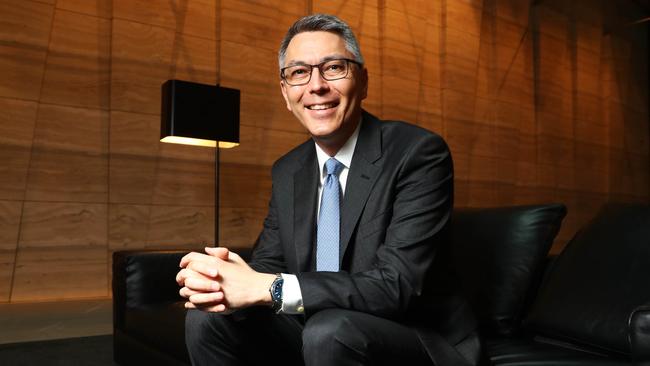Covid weighs on BHP top executive pay, annual report shows
The miner’s CFO says he’s concerned about risk of double taxation, with Australian corporate tax rates ‘comparatively high’.

The coronavirus pandemic has trimmed the annual pay for BHP’s chief executive Mike Henry, but he still was paid more than $US6m ($8.19m) after half a year as CEO.
Mr Henry – who replaced former chief Andrew Mackenzie in January – said in the company’s annual report that COVID-19 continues to have “a devastating effect on lives, society and the global economy.”
It also hit longer term bonus payments for the miner’s top executives after BHP’s financial performance fell “slightly short” of remuneration stretch targets set at the outset of the year, the annual report said.
Noting that although the pandemic was “outside the control” of both Mr Henry and Mr Mackenzie, its impacts would reduce “the remuneration outcome for executives from what they would have otherwise been.”
Mr Henry, received a total payment of $US6.07m, including a base salary of $US1.7m, a pension contribution and other benefits, including a long-term incentive payment for an award set in 2015.
It compares against Mr Henry’s annual remuneration target of US$7.5m and a maximum possible remuneration of $US11.6m.
For serving the first half of the financial year, former chief Andrew Mackenzie earned $US2.4m.
Meanwhile, BHP chief financial officer Peter Beaven has warned that the mining giant continues to be “concerned” about the “risk of double taxation” and says they will continue to support tax competitiveness wherever they operate as it is an important factor in the company’s investment process.
Writing in BHP’s economic contribution report, Mr Beaven said that although countries should “continue to have the right to extract profits from the extraction of commodities,” the mining company wanted to see the further development of a “competitive” global tax system.
“We believe companies should pay their fair share of tax and countries should have taxation rights commensurate with value created in those countries,” Mr Beaven said.
“For the extraction industry, as the right to extract commodities is inherently and substantially connected with the country in which the commodities are located, such countries should continue to have the right to tax profits from the extraction of commodities.
“For these reasons, we support an outcome that results in the taxing rights in relation to profits associated with commodities continuing to remain with production countries.
“We continue to contribute to the development of a solution that provides for a globally competitive tax system that supports economic growth and long term sustainable tax contributions, and one that provides certainty and transparency on the taxing rights of profits associated with the extraction, sales and marketing of commodities.”
The report revealed that BHP paid $US9.1bn in taxes, royalties and other payments to governments last financial year, resulting in an average global effective tax rate of 33.2 per cent.
Of this amount, $US7.5bn was paid to governments in Australia, resulting in an effective tax rate of 31.7 per cent and bringing the amount of tax paid in the country over the past decade to $76bn.
In the report, the company said that Australia was an example of a country with a “comparatively high” corporate tax rate that could act as a disincentive to investment.
“When we assess which projects we will invest our capital in, tax competitiveness is an important consideration,” the report read.
“We have global competition for limited capital across our many investment options around the world: when taxes are lower in one country compared to others, all other things being equal, we will invest in that country.
“Consequently, given the global reduction in corporate tax rates across OECD countries, it may be challenging for countries that retain comparatively high corporate tax rates (such as Australia) to remain internationally competitive in attracting capital.”
BHP said it would continue to “engage in the reform” of tax rules in the jurisdictions in which they operate through a number of industry associations such as the Business Council of Australia and the Minerals Council.
The company also disclosed that it had six subsidiaries located on the European Union’s list of non-competitive tax jurisdictions, which lists non-EU countries that act as common tax shelters for global companies.
Four of the subsidiaries are located in the Cayman Islands, one in Trinidad and Tobago, and one in Panama.
One of its Cayman Island subsidiaries, Global BHP Copper, pays most of its tax in the US while another – RAL Cayman pays most of its tax in Peru.
BHP said these subsidiaries were acquired as the result of historical mergers and are subject to either UK or Australian foreign tax rules, and that it is currently considering liquifying two of its Cayman Island subsidiaries.
In 2018 BHP agreed to pay the ATO $529m and change the ownership structure of its Singapore arm to settle a $1bn claim for a decade’s worth of tax, between 2003 and 2013, plus interest and penalties.
Mr Beaven said BHP believes strongly in paying their fair share of tax.
“We believe companies should pay their fair share of tax and countries should have taxation rights commensurate with value created in those countries,” he said.



To join the conversation, please log in. Don't have an account? Register
Join the conversation, you are commenting as Logout